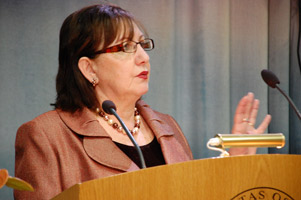The myth of a Christian Europe
In her ARENA lecture May 2 2012, Seyla Benhabib argued that Europe should not forget its cosmopolitan roots.
Samuel Huntington, the man behind the thesis 'clash of civilizations', has branded those who promote this thought for 'dead souls'.
The myth of a Christian Europe as a battlefield for a clash of cultures has grown to prominence since 9/11. Much of this is built on historical fallacies.
Benhabib pointed out that the siege of Vienna in 1683, which has been an important event in the myth constructions, was not a clash between Christians on one side and Muslims on the other. It was rather an Ottoman campaign, supported by Muslims, Protestants and Orthodox Christians to protect Hungarian Protestants against the Catholic yoke of the Habsburgs, In the end, Vienna was saved by Polish forces with support from Lithuanian Muslims.
– Hardly the impression of a clash of religions, Benhabib stated. – Muslims have been as much a part of European history as other groups, from Muslim rule of the Iberian Peninsula for eigth centuries to the multicultural Istanbul, Benhabib's own birthplace.
The age of cosmopolitanism
The cosmopolitan ideas have roots back to Socrates, Locke, Rosseau and Kant. 'I am not a citizen of Athens', but of the world, Socrates said, according to Montaigne.
Since the Universal Declaration on Human Rights in 1948 the European society has largely moved from internationalism to a cosmopolitan society, Benhabib argued. Rights based on a birthright as humans, not as citizens of a state or members of a nation are manifest in national constitutions and the treaties of the European Union. – These may not be steps towards a world constitution, but they are the constituents of a global society.
– The cosmopolitan idea may be a bit old-fashioned and has been attacked from left and right in the century of nationalism, the 20th century. From communitarians, neo-liberal capitalists and from post-modernists. The term has been a placeholder for multiculturalism and imperialism. Its critics have missed what is new in this thinking, Benhabib argued.
A perfect storm
Europe is plagued by multiple crisis that undermine the cosmopolitan ideals. Economic instability in a technocracy removed from people creates an insecurity that has led to xenophobia egged on by charismatic leaders. While the rest of the political elite is corrupt.
– In this climate, Europe's intellectuals have pointed out problems and scandals rather than the importance of dialogue with communities, Benhabib said. – I promote a cosmopolitanism without illusions, with a focus on inequality and diversity, grounded in humans a moral beings with the birthright to rights.
The ARENA Lecture: A longstanding tradition
ARENA lecture has become a tradition at the University of Oslo. In this lecture series ARENA invites politicians and other influential persons to hold an open lecture on a topic that is both academically interesting and of public interest.
Among former speakers we find the former Norwegian prime ministers Gro Harlem Brundtland and Kjell Magne Bondevik, former Secretary General of the Council of Europe Daniel Tarchys, former Environment Commissioner in the European Commission Margot Wallstrom, Norwegian Minister of Foreign Affairs Jonas Gahr Støre and the Dutch author and historian Geert Mak.
